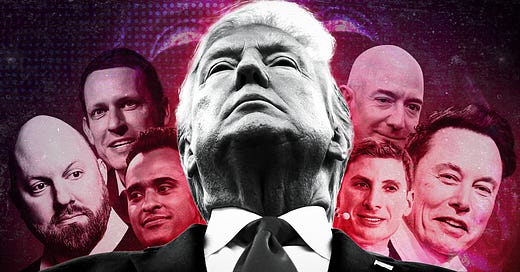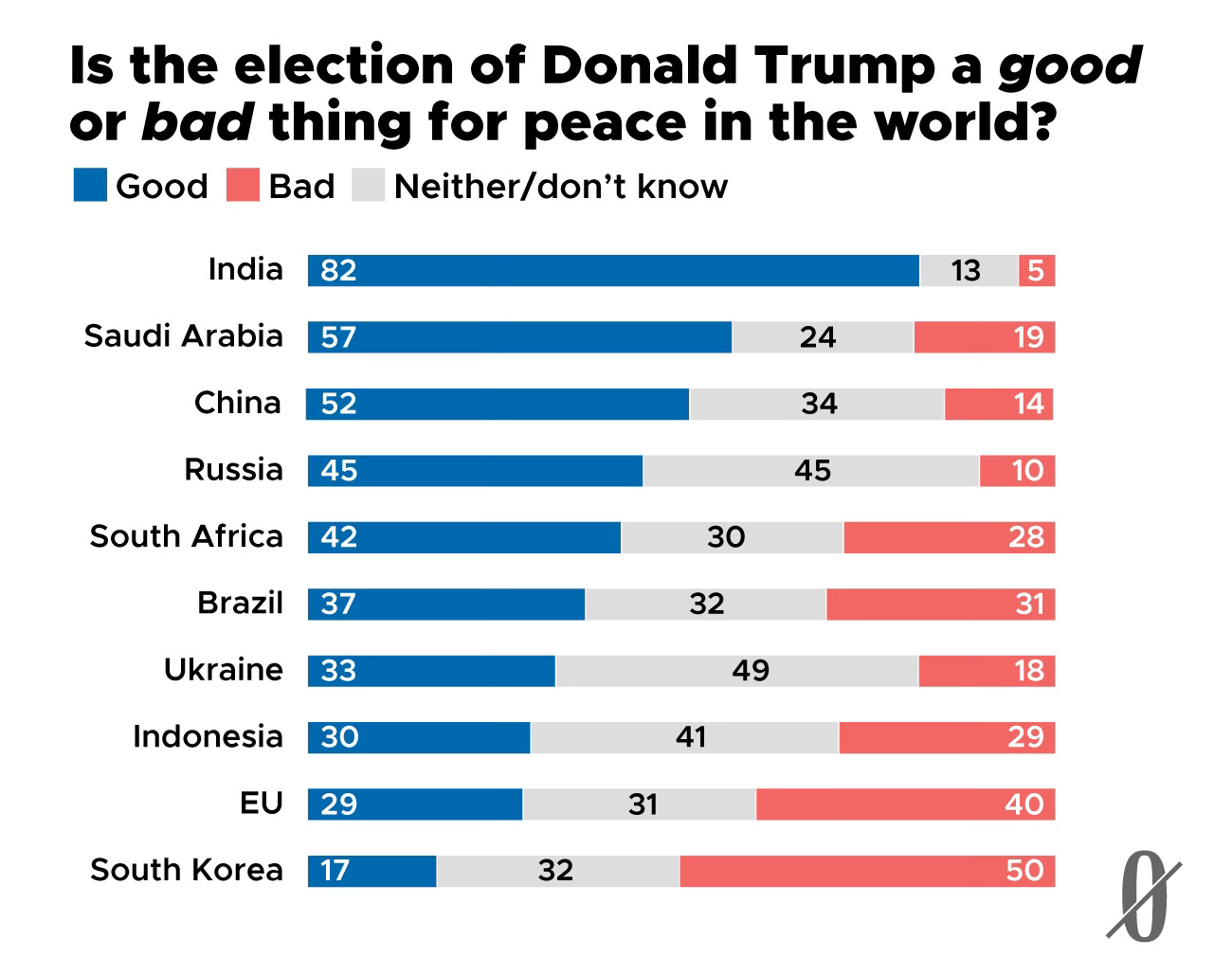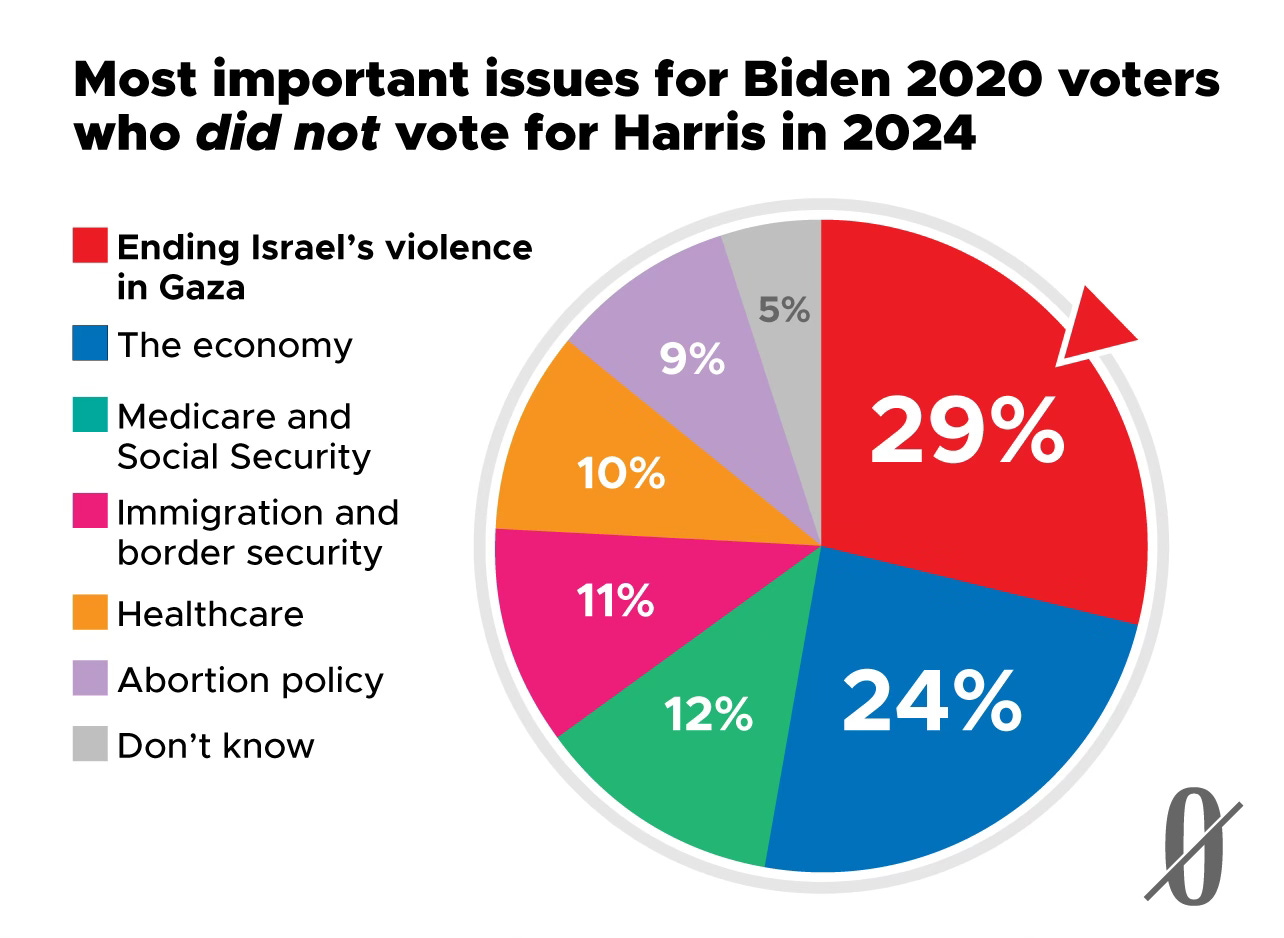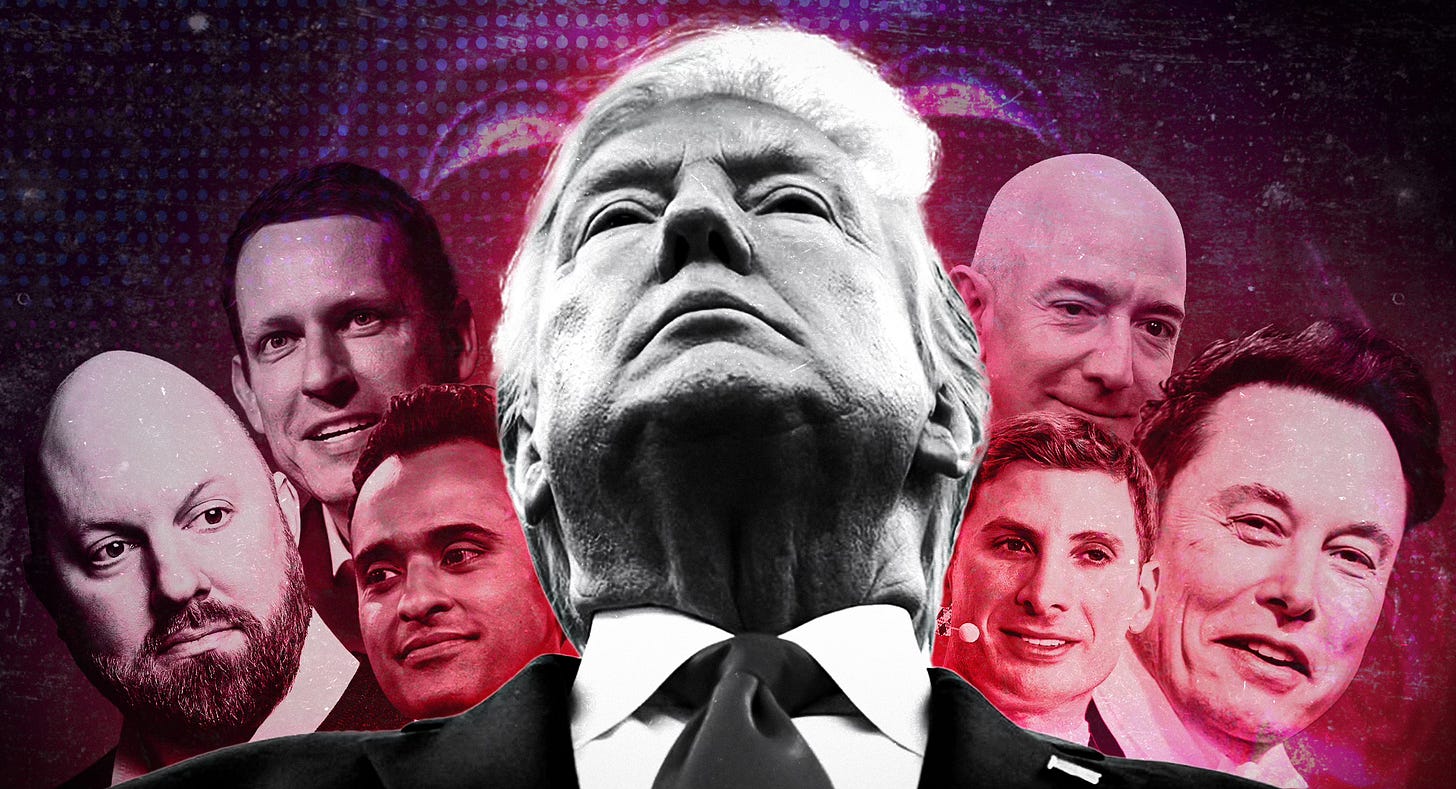The Looming Tech Takeover
Plus: Robo-cop found wanting, Trump’s Gaza win, Hegseth versus international law, why Biden voters abandoned Harris, happy TikTok refugees, and more!
Note: As America approaches a jarring presidential transition, some things remain constant. For example: (1) NonZero is still hiring; (2) NonZero Managing Editor Connor Echols continues to put out the Earthling without my oppressive oversight (but with help from Andrew Day and graphics ace Clark McGillis), while I spend the next five weeks in crash bookwriting mode before returning to Planet Earthling to restore order; (3) I nonetheless am finding time to join Connor and Andrew on NonZero World, which will post today on the NonZero podcast feed and YouTube channel; (4) I continue, at those same venues, my regular podcast conversations; this week I posted chats with psychologist Paul Bloom, whom I harass on a fortnightly basis, and AI watcher Tim Lee. Also: In the first week of February I’ll be holding a Zoom call with NZN members to discuss the opening days of the Trump II era—details about that in next week’s Earthling. —Bob
—At least eight Americans have been wrongly arrested because of false matches produced by facial recognition software, according to an investigation by reporters at the Washington Post, who noted a tendency among some police officers to “treat software suggestions as facts.” Police in at least 12 states have used facial recognition tools to identify and arrest suspects who have no other known connection to the crime in question, the Post investigation found.
—President-elect Trump is returning to the Oval Office with strong support in the Global South, according to a survey of 28,000 people in 24 countries conducted by the European Council on Foreign Relations late last year. Support for Trump in the developed world is notably lower.
—President Biden, vowing that we “will not let America be out-built when it comes to the technology that will define the future,” issued an executive order that opens federal land to companies looking to build AI data centers. Last month, five Democratic senators sent a letter to the White House opposing such a move on environmental grounds.
—As Trump threatens to bomb drug cartels, Mexico is gearing up for a (legal) counteroffensive. Mexican diplomats submitted a brief to the United Nations Security Council arguing that it is illegal under the UN Charter for a foreign state to attack non-state actors within the territory of a government that didn’t consent to military intervention. (More on Trump’s foreign policy below.)
—Scientists are raising concerns about the rise of “panzootic” viruses—pathogens (like the still-spreading H5N1 bird flu) that readily jump between species and pose significant pandemic risk. Researchers say human encroachment on natural habitats, which forces wildlife into ever-smaller spaces, may be creating conditions that accelerate the evolution of these species-crossing viruses.
—More than one in four Americans who voted for Joe Biden in 2020 but not for Kamala Harris in 2024 cited “ending Israel’s violence in Gaza” as the issue that had the most bearing on their decision, according to a poll from the Institute for Middle East Understanding and YouGov. (More on the war in Gaza below.)
In 2017, Donald Trump took the oath of office flanked by politicians, former presidents, and a few prominent donors. On Monday, a new group will join this parade of dignitaries: the three richest men on Earth.
Elon Musk, Jeff Bezos and Mark Zuckerberg—who are worth a combined $884 billion—will all have seats on the inaugural platform as Trump is sworn in for his second term in office, according to NBC News. Their presence underscores Trump’s increasing closeness to America’s tech tycoons, a connection strengthened by Vice President-elect J.D. Vance, whose career was in part launched by billionaire venture capitalist Peter Thiel.
The Trump-tech mind meld has been taking shape at Mar-a-Lago, where tech titans have played key roles in the transition. Musk has made no secret of his role in these efforts, and he has been joined by other Silicon Valley bigwigs, including Oracle co-founder and fourth-richest man on Earth Larry Ellison, who participated in transition planning meetings just one week after the election. Legendary venture capitalist Marc Andreessen has been “quietly and successfully recruiting and interviewing candidates for positions across the incoming administration,” including nominees for national security jobs, according to the Washington Post. Outspoken investor and Musk acolyte Shaun Maguire is “a staple of the Trump transition” who has been interviewing candidates for senior defense roles, according to the New York Times.
Mar-a-Lago has been “crawling with executives from defense tech firms,” including senior players from Anduril and Thiel-founded Palantir, the Times reports. Some tech leaders will even be joining the administration. Palantir adviser Jacob Helberg is slated to serve as the undersecretary of state for economic growth, energy and the environment, and PayPal co-founder David Sacks will be Trump’s AI and crypto czar.
Tech leaders who have yet to find their way into Trump’s inner circle are now working hard to get there. OpenAI—led by Sam Altman, who gave $1 million to Trump’s inaugural fund and plans to attend the inauguration—announced a “blueprint” for AI development that calls for minimal regulation and maximal government investment in AI infrastructure. The pitch revolves around beating China in a tech arms race. “AI is the ultimate race,” wrote Dane Stuckey, OpenAI’s chief information security officer. “OpenAI, and the Western World, must win—and we have a blueprint to do so.” Altman will travel to Washington later this month to make his case to the new administration.
The growing influence of tech stalwarts in the MAGA movement has led to friction with Trump’s old guard. Following a debate over H-1B visas for skilled workers—a dispute in which the president-elect joined Musk and tech entrepreneur Vivek Ramaswamy in supporting the visas—one-time Trump consigliere Steve Bannon pledged to have Musk “run out” of the White House. “He is a truly evil guy, a very bad guy,” Bannon told Italy's Corriere della Sera. “I made it my personal thing to take this guy down.”
So far, though, Musk appears to have the upper hand. Trump once rode into office alongside a ragtag team of populists. Eight years later, his team looks a lot less ragtag, and a lot less populist.
President Biden and President-elect Trump each took credit for the Israel-Hamas ceasefire scheduled to commence this weekend. Of the two, though, Trump may have the stronger claim.
According to Israeli media, it was Trump’s Middle East envoy, Steven Witkoff, who strong-armed Israeli Prime Minister Benjamin Netanyahu into accepting a ceasefire deal. Last Friday evening, when Witkoff requested a meeting with the prime minister the next day, Netanyahu’s aides said it would have to wait until after the Sabbath. Witkoff “explained to them in salty English that Shabbat was of no interest to him,” reports Chaim Levinson of Haaretz. Netanyahu met with Witkoff on Saturday and the two hammered out the agreement, which involves an exchange of Palestinian prisoners for Israeli hostages and the withdrawal of Israeli troops from population centers in the Gaza strip.
Other Israeli outlets have taken note of Witkoff’s success. “Trump envoy swayed Netanyahu more in one meeting than Biden did all year,” declared a headline in the Times of Israel, citing anonymous Arab officials. The Biden White House has quietly acknowledged that Witkoff was a driving force behind the deal.
Whether the six-week ceasefire will produce a long-term truce, or even take effect, is far from certain, but Trump’s apparent diplomatic win raises a big question: If a ceasefire agreement was within reach, why did it elude the Biden administration for so long?









